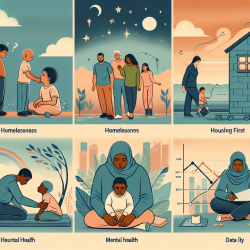Understanding Trauma-Informed Care for Refugees
In the realm of speech-language pathology and therapeutic services, the implementation of trauma-informed care is crucial, especially when working with vulnerable populations such as refugees. A recent study titled Exploring Syrian Refugees’ Access to Medical and Social Support Services Using a Trauma-Informed Analytic Framework provides valuable insights into the challenges faced by Syrian refugees in accessing medical and social support services. This blog aims to highlight the key findings of this research and how practitioners can leverage these insights to improve therapeutic outcomes for refugee children.
Key Findings from the Research
The study conducted interviews with Syrian refugee migrant workers in Jordan, focusing on their access to medical care and mental health services. The research identified several critical dimensions of trauma-informed care, including safety, trust, intersectionality, and empowerment. These elements are vital in creating an environment where refugees feel secure and supported.
One of the significant findings was the importance of safety, both physical and emotional, for refugees. The study highlighted that many refugees experience ongoing trauma due to their displacement and the conditions they face in refugee camps. Practitioners must prioritize creating a safe and supportive environment for refugee children to foster positive therapeutic outcomes.
Implementing Trauma-Informed Care in Practice
Practitioners working with refugee populations can implement trauma-informed care by focusing on the following strategies:
- Creating a Safe Environment: Ensure that therapy sessions are conducted in a space where children feel physically and emotionally safe. This includes being mindful of the language used and the physical setup of the therapy room.
- Building Trust: Establish a trusting relationship with refugee children and their families. This involves being transparent about the therapy process and respecting their cultural backgrounds and experiences.
- Empowerment and Choice: Encourage children to have a voice in their therapy sessions. Allow them to make choices about their activities and goals, fostering a sense of autonomy and empowerment.
- Intersectionality: Recognize the diverse identities and experiences of refugee children. Tailor therapy approaches to accommodate their unique needs and cultural contexts.
Encouraging Further Research
While the study provides valuable insights, there is still much to learn about the specific needs of refugee children in therapeutic settings. Practitioners are encouraged to engage in further research and collaboration with other professionals to develop evidence-based practices that address the complex challenges faced by refugee populations.
Conclusion
Implementing trauma-informed care is essential for improving therapeutic outcomes for refugee children. By focusing on safety, trust, empowerment, and intersectionality, practitioners can create supportive environments that promote healing and resilience. As professionals dedicated to creating positive outcomes for children, it is our responsibility to continue learning and adapting our practices to meet the needs of vulnerable populations.
To read the original research paper, please follow this link: Exploring Syrian Refugees’ Access to Medical and Social Support Services Using a Trauma-Informed Analytic Framework.










